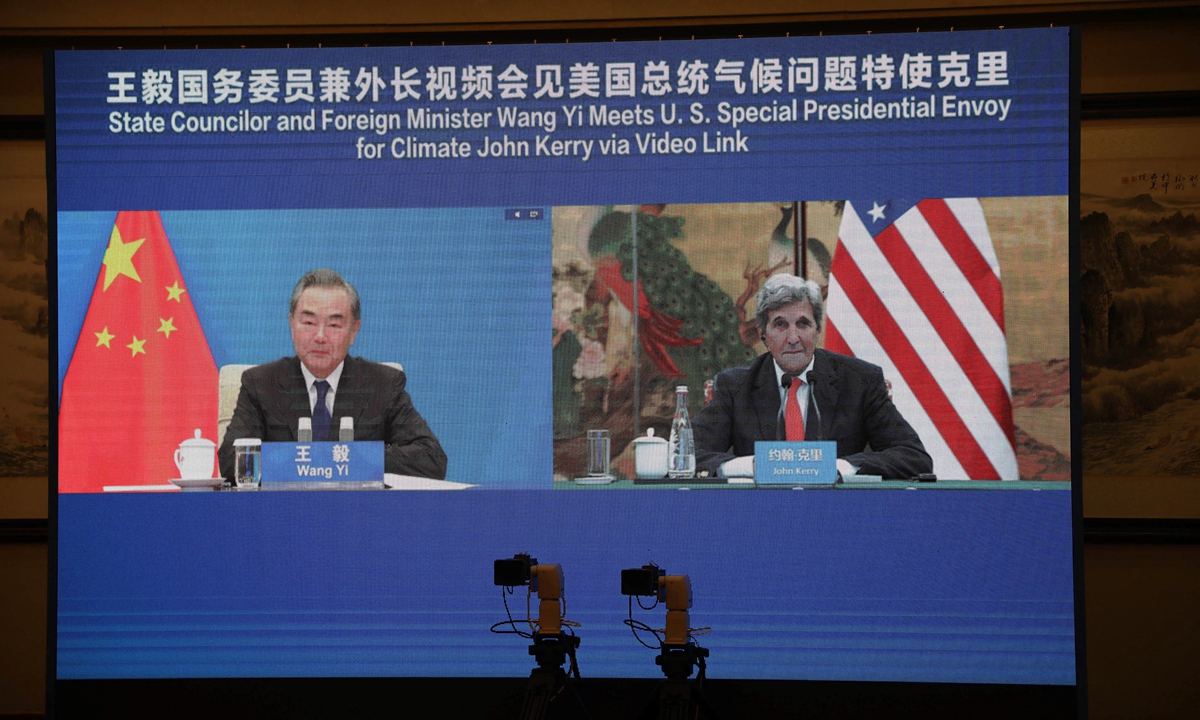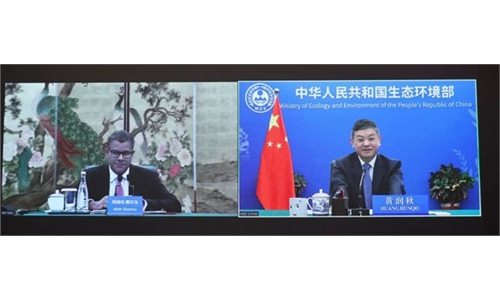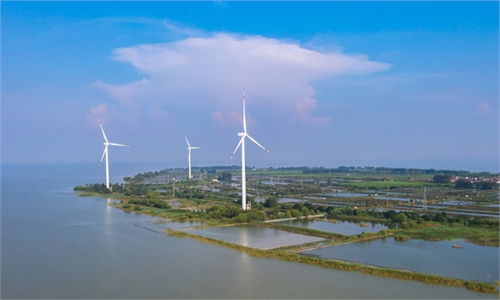China-US green cooperation set to progress amid twists
US urged to stop hostility toward China, avoiding politicizing climate issue

Chinese State Councilor and Foreign Minister Wang Yi meets with the US Special Presidential Envoy for Climate John Kerry via video link on September 2. Photo: AFP
China and the US are making a somewhat bumpy journey toward climate cooperation, with Chinese officials and experts still calling for partnership between the two countries to tackle climate change, but urged the US to change its hostile attitude toward China and treat China-US cooperation more sincerely.
They made the call shortly after the two countries' tense relations had spilled over into their climate talks, with a certain US government official blaming China for not doing enough on climate issues, although the blame is more like an unpleasant sound rather than an interruption of the two countries' ongoing climate talks.
Vice Minister of Commerce Wang Shouwen on Wednesday called on China and the US to play an "ensemble" of low-carbon cooperation. He made the comment during the China Provinces-US States Green & Low-carbon Cooperation Seminar and Matchmaking in Xiamen, East China's Fujian Province.
"China and the US share common ground in advancing low-carbon development, and that cooperation will not only serve each other's goal of cutting carbon emissions but also contribute to strengthening bilateral economic and trade cooperation," Wang said.
According to information provided by the Fujian Provincial Department of Commerce,the event, which focuses on enhancing climate cooperation between Chinese provinces and US states, has attracted about 260 local government representatives and businesspeople from the two countries, including representatives from US industrial giants like Dell, DuPont and General Motors.
Officials from several US states including Ohio and Washington also said during the fair that they hope China and the US can carry out more pragmatic cooperation in green areas to cope with climate change challenges together.
The conditions for China-US climate cooperation are becoming increasingly ripe not only as China is going to great lengths to meet its carbon neutrality goals, but as the US has seemingly reemerged on the global stage of climate cooperation, with moves like rejoining the Paris Agreement and US President Joe Biden's reported attendance of the 26th UN Climate Change Conference.
Experts stressed that China will always open its door to cooperation and dialogue in green development, but they criticized the US for showing an "insincere" attitude, placing the two countries' low-carbon partnership, which could be carried out "in any aspects" theoretically, under much uncertainty.
US climate envoy John Kerry reportedly said recently that China can do more in terms of tackling climate change, implying that China's efforts are insufficient as long as it continues to build coal-fired power plants.
"The US has shown hypocrisy and short-sightedness on the issue of climate cooperation with China. It has politicized the climate issue and taken it as a diplomatic tool against China, and yet tried to shift the blame to China," Li Haidong, a professor at the Institute of International Relations at the China Foreign Affairs University, told the Global Times.
He Weiwen, a former economic and commercial counselor at the Chinese consulate general in San Francisco and New York, also criticized the US for "finding fault" with China, as blaming China for not doing enough in tackling carbon emissions does not hold water.
"Power generation using coal, petroleum and natural gas accounts for about 60 percent of overall power generation in China and the US. Power generation using recyclable energy accounts for 29 percent in China, compared with the US' 20 percent. But this does not include carbon emissions from California wildfires and wars the US launched," he said.
He also said that compared with the US, the UK shows more sincerity in conducting climate cooperation with China.
Shortly after Kerry wrapped up climate talks with Chinese officials earlier this month, Britain's senior climate change official Alok Sharma also arrived in Tianjin to meet his Chinese counterpart Xie Zhenhua. Sharma was later quoted by Reuters as saying that he "welcomes China's commitment to climate neutrality by 2060 and looks forward to discussing China's policy proposals towards this goal."
General climate
Chinese officials and analysts also stressed that China and the US' climate cooperation can't succeed without an improvement in their general economic and trade relations, urging the US to change their crackdown policies against China in other sectors like high tech and finance.
According to Wang Shouwen, the Vice Minister of Commerce, it will be unable to step up cooperation focused on green development and low-carbon economy without healthy and stable bilateral trade ties. He also noted that the nature of China-US economic and trade relations is mutually benefit and win-win.
His words echoed remarks made by China's State Councilor and Foreign Minister Wang Yi, who warned that antagonism from the US could hobble climate cooperation like desert to an oasis during his talks with Kerry.
Wang Shouwen and Wang Yi made the remarks after Kerry recently pointed out that the climate issue is not a geostrategic weapon, suggesting that the US will work with China on climate change but crack down on other sectors.
Xiao He, an expert from the Institute of World Economics and Politics at the Chinese Academy of Social Sciences, said that climate cooperation involves a lot of details that could cause controversies, such as clean technology standards and capital flow, and it's very difficult to proceed with such cooperation if the members involved don't trust each other.
"The US should create conditions to alleviate China's burden, as a low-carbon push is already adding economic costs to China," he told the Global Times. "But now they are doing the opposite."
Lin Boqiang, director of the China Center for Energy Economics Research at Xiamen University, also told the Global Times that the premise of China-US green cooperation is that the US should show more sincerity and a cooperative attitude. But their crackdown measures, like starting anti-dumping investigations into Chinese energy exports and concerns about so-called technological theft, are creating obstacles to China-US green partnership.



